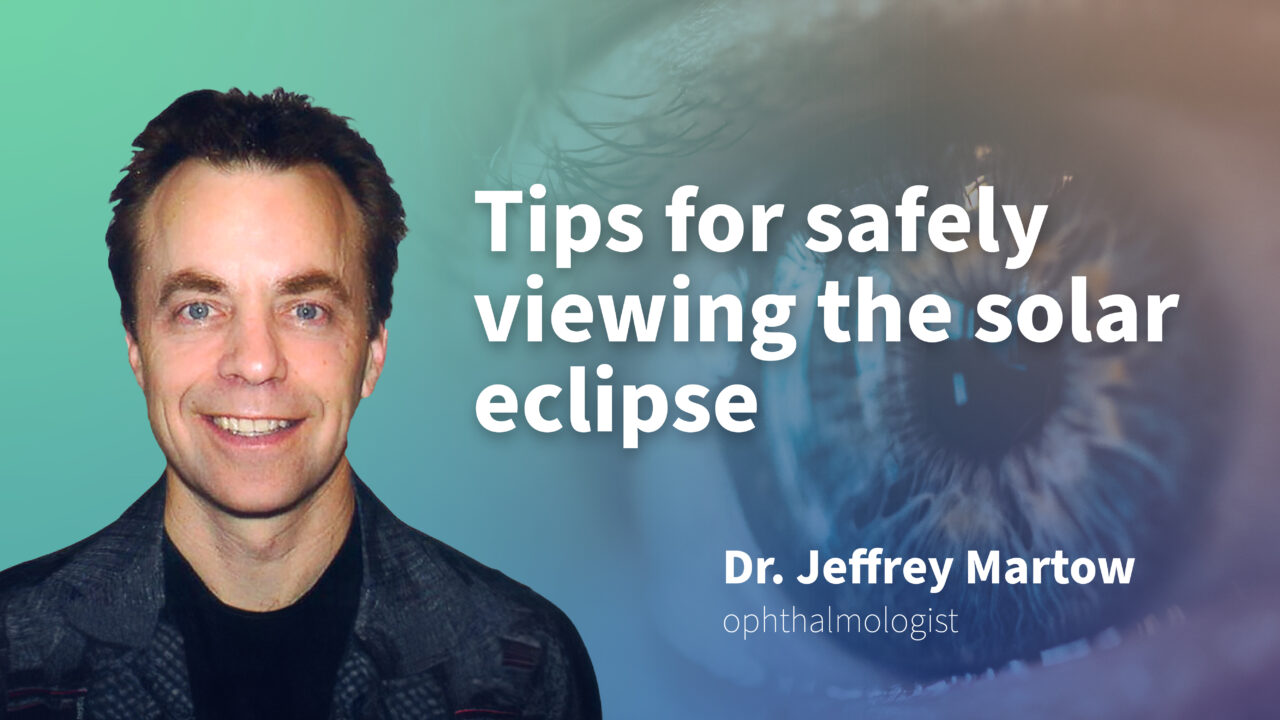Practicing safe eye health is important because our eyes are vital sensory organs that enable us to navigate and experience the world. Maintaining good eye health can help prevent vision loss, reduce the risk of eye diseases like cataracts and glaucoma, and contribute to overall well-being. Regular eye check-ups, protecting against UV rays, proper hygiene, and avoiding eye strain are all part of safe eye health practices.
Different types of light can have different impacts on your health. The types of light vary across the entire electromagnetic spectrum, ranging from low-energy radio waves to high-energy gamma rays, each with its own properties and phenomena. One such phenomenon is a solar eclipse, which draws the attention of millions across Canada and the globe.
“It is important to know that looking directly at the sun, whether during an eclipse or not, poses a significant risk to eye health,”
Dr. Jeffrey Martow
While this natural phenomenon offers the opportunity to observe a spectacular natural display, it also poses potential risks to eye health if proper precautions aren’t taken, so it is crucial to understand how to safeguard our vision while enjoying the event.
“It is important to know that looking directly at the sun, whether during an eclipse or not, poses a significant risk to eye health,” says Dr. Jeffrey Martow, ophthalmologist, Oak Valley Health. “However, especially during an eclipse, it can cause irreversible damage to the eyes.”
Martow advises against using ordinary sunglasses to view the eclipse, as they are inadequate for providing sufficient protection to the eyes from the intense solar radiation. Instead, specialized solar filters, certified to meet international safety standards, such as ISO 12312-2, are essential and recommended for safe viewing.
Advice for eclipse watchers*
- Carefully inspect eclipse glasses or solar filters for any signs of damage or wear before wearing them. If you have any doubts, refrain from using them to avoid potential harm.
- Before looking at the sun, ensure your eyes are shielded by approved eclipse glasses or solar viewers. Only after securely covering your eyes should you glance at the sun, ensuring to turn away and remove the filter immediately afterward.
- The only time it’s safe to view the sun during an eclipse without a solar viewer is during the totality phase — the maximum phase of a total solar eclipse, during which the moon’s disk completely covers the sun’s bright face. However, once the sun begins to reappear, promptly resume using your solar filter to prevent eye damage.
- Under no circumstances should you attempt to view the uneclipsed or partially eclipsed sun through unfiltered cameras, telescopes, binoculars, or similar devices. Doing so can result in severe eye injury from the concentrated solar rays.
As you prepare to watch nature’s amazing spectacle, remember to stay safe. By following these recommendations, you can enjoy the solar eclipse without putting your eye health at risk.
Subscribe
This article appeared in the March 2024 issue of The Link. To receive Oak Valley Health’s community newsletter, subscribe now.
*Advice provided by The American Academy of Ophthalmology
